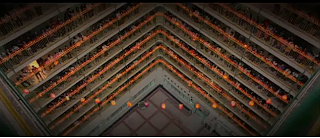Movie: «I Love Hong Kong 2011»
Director: Eric Tsang, Chung Shu Kai
Released in: 2011

(Video 1: Trailer of «I Love Hong Kong 2011» )
(Video 2:
Theme song of «I Love Hong Kong 2011»)
The
authentic social issue of 21st Hong Kong
Firstly, «I Love Hong Kong 2011» major describes
the grassroots level peoples’ life, their desires and wishes, social issues,
and also political opinions in 21st Hong Kong especially after
global financial tsunami. Teo, S. (1997)
noticed that “Cantonese
cinema tended towards social issues,
attacking the feudal system, commenting on patriarchal values and reaffirming
the family.”(PP.49) «I Love Hong
Kong 2011» proved
that for it pointed out many social issues in Hong Kong, for examples anxious
of global financial tsunami after 2008, shops forced to close down for the large
business increase the rent, and also regain the warmth of the family in the
high technology 21st era. Most of them specific describe the anxious
feeling and majority willing of Hong Kong people, also the social identity of
each group of people, especially grassroots level people.

The changed
family relationship
Secondly, the most concern is their family structure;
Ng’s family had two daughters and a son, they moved to public estate for
bankruptcy of Ng Shun, they no longer have a big house between a separate room
but have share space with each other, the changed values and relationship use
media to present to the audiences, not only reflect the real society of family
and neighbor relationship, but pointed out that the influences of high technology
trend. After Ng’s family moved to the public estate, the three sons and daughters
know more about the previous story of their father and grandpa, all of the
family members get closer together and have more interpretation and
communication for the smaller house, also, this movie shows out more the living
style and benefits of grassroots level people instead of exclude them, for
examples, if one of them in difficultly and all will support, no matter what
they were doing for. Ng’s family had different career and personality, it shows
more the core values and different level trends through this movie, for
examples, Hong Kong people change to become cold and detached with other people
for the unhappy things appeared in 21st society, such as the financial
crisis and the health problem etc., also, majority of young female want to be a
model for the young model trend in that time.
The
major things throughout the series of movie
Thirdly,
«I Love Hong Kong 2011» use public estate
as the main focus because of the public estate was the projection place of a
large group of people grow up and embody the spirit of Hong Kong. Besides, the
rent increase rapidly and large business and multiple shop occupied forced the
community store to close down. Hong Kong people unite again to fight for the
big business. Teo, S. (1997) also mentioned that “The revival
of Cantonese played its part in raising the audience's level of interest,
bringing the intimacy between the low-life characters on the screen closer to
mainly working-class audience.”(pp.144) «I Love Hong Kong 2011» represent the experience and collective memory Hong Kong, mostly people
had more concern about the social and political issues of Hong Kong, also the
trend, changed values, and the compassion of Hong Kong people, especially family
love, romantic love, friendship in each people of each levels. Many plots in
the movie project the reality, people no matter live in anytime also can know
more about the real society in eighties to twenty-first era Hong Kong through the series «I Love Hong Kong» especially «I Love Hong Kong 2011».
References:
Teo, S. (1997). The New Wave. In Hong Kong cinema: The extra dimensions. (pp.137-161). London: British Film Institute.
Cheung Wing, Tammy
10520443/21047744




The review has made a brief textual analysis of the selected film that covers the reflection of emerging social phenomena, the changing family relationships and the representation of “collective memory” shared among Hong Kong people. The discussion is quite inspiring and supported by some simple theoretical concepts.
ReplyDeleteYou might consider citing some memorable scenes that depict the sense of localness (e.g., family interactions, living/working environment) and situate them in the larger social context. This helps support your arguments on reflecting reality and creating collective memories of Hong Kong people.